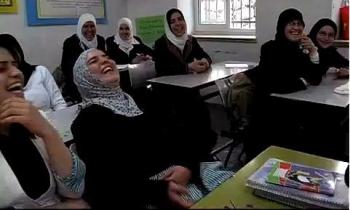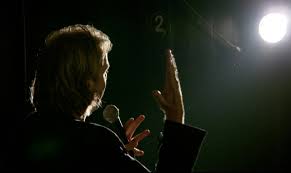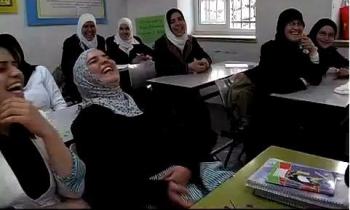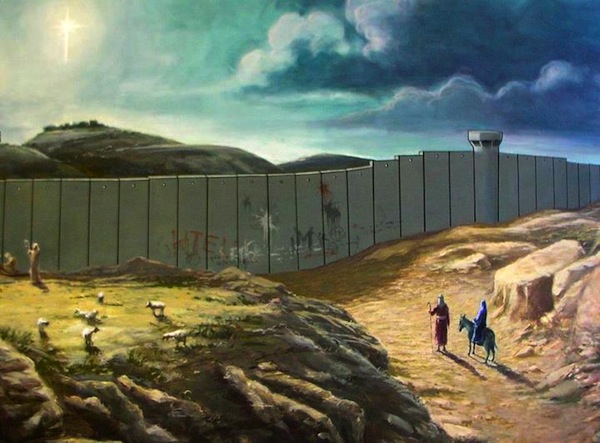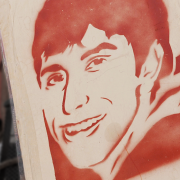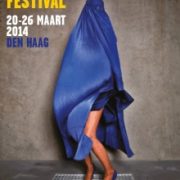“Our life is a succession of jokes” – Two documentaries explore humor and conflict
By Fiana Gantheret
The Happy Sad Route (and a Comedian) by Linda Hakeboom: a documentary movie about the road trip of a Dutch man in Bosnia and Herzegovina, Croatia and Serbia. A Dutch stand-up comedian Jan Jaap van der Wal, alias JJ, goes on a journey in the former Yugoslavia to meet with fellow comedians. The trailer can be viewed here.
(No) Laughing Matter (Blagues à part), by Vanessa Rousselot: a documentary film looking at expressions of humor in Palestine. Vanessa Rousselot embarks on a journey in the West Bank to find out what Palestinians have to say about their own sense of humor. The trailer can be viewed here. The English version of the movie can be accessed here.
The two movies approach situations in which people have experienced or still experience a hard way of life. What are the reactions there when humor is mentioned? What do they joke about? Is humor a necessity or a luxury? Through the themes of laughter and distance, Vanessa Rousselot and Linda Hakeboom deal with sensitive issues in a subtle and profound way.
The proposal
It is impossible to say that the people seen in these two movies, be they Palestinians, Bosnians, Croats or Serbs, perceive the question of laughter and its potentials in the same way. However, some reactions in both contexts were very similar. One sentence for example was heard in both movies, one sentence that relates to the sense of absurdity emanating from their situation : Our life is a succession of jokes ; Our situation is one big joke.
I can understand that in Palestine where the conflict still exists, one of the reactions coming from the oldest ones – not the youngest, interestingly enough – was to reject the mere possibility of joking : We don’t have the heart to laugh ; I will tell you thousands of jokes when we will be free. What prevails is anger, and it casts a shadow on everything else.
In The Happy Sad Route, JJ ends up his tour of the region with a performance in Mostar, Bosnia, infamous for the 18 months siege of the city in 1992-1993. He asks Miranda Loncar, a fellow comedian from Bosnia, if she thinks he can make jokes about Srebrenica. She does not know. She cannot predict if the audience will react well. She cannot predict if the joke will be too big or too edgy for the audience. JJ then tells the camera : I will try it ; I need to find where the edge is.
Jokes are made about the conflict, past or present, as well as about the persistent tensions in the former Yugoslavia. When a person was interviewed or filmed telling a joke, I was afraid it would be borderline. I feared its repercussions. It is just a joke, but I thought it had the potential to bring us in a situation where it will be impossible to go back, where sensitivities will be hurt irreparably. I wondered if myself could take it. But it did not happen. The joke was funny, and good enough to combine this vertiginous feeling of edginess and what is acceptable, what is hearable.
Alksandar Perisic, from Serbia, has an enormous talent in this respect : I’ve seen people starving to death. In retrospect, we could have organised my sister’s wedding better.
These jokes blend together the edge and the lightness. And the magic happens.
Sometimes, the edge cannot be taken off. When asked if he knows a joke about the Palestinian Authority, an inhabitant of Nablus, in the West Bank, answered that he cannot tell one, as he works for the Ministry of Education. But he said it as if that was a joke, with a smile.
What are we joking about ?
Numerous jokes are made about the conflict. Miranda Loncar, for example, evokes Slobodan Milosevic. She tells JJ that she thinks of him as a step-dad, because so many decisions he made affected her life.
Jokes are also made about everyday life, and, as in any other country, about specificities of a population, and sometimes at the expense of a portion of that population, like in any other area of the world (see the French and the Belgians, the Americans and the Canadians). In these instances, the conflict is an element of context. In the West Bank, Palestinians make fun of Hebronites, the people coming from Hebron : One day, a curfew is declared in Hebron. Out of curiosity, Hebronites went into the street to see what all this was about.
Linda Hakeboom in The Happy Sad Route: JJ, do you always joke about everything you see ?
JJ : I look for the humour in things. It helps me create a logic in order to understand them. It is a way to come to terms with what I see.
Humor, a filter through which the unbearable is bearable ? It is also a way to evoke subjects that are difficult to address otherwise. The question of God in Israel and Palestine concerns so many people and for so many serious reasons that joking is a good channel to address it : God tells the Jews : you are the chosen people ; God tells the Muslims : you are the best community of people ; God tells the Christians : you are the salt of this earth. Either there are three Gods up there, or there is only one and he is making fun of us.
If Joseph and Mary were coming today to Bethleem, they would need papers and travel autorisations in order to reach the baby Jesus. As depicted by Banksy in his Christmas card recently, it is possible to express the absurdity of a situation in a punchy, striking and humorous way, especially when the situation, being absurd, provides the tools to make the jokes.
Similarly, jokes are stopped from passing the checkpoints, says a Palestinian living in Israel, met by Vanessa Rousselot. In Israel, the jokes used to come from the West Bank, but at present, they don’t travel anymore between Hebron and Galilee. That man performs for the first time as a stand-up comedian in Haifa.
Linda Hakeboom and JJ decided to go on a journey in a region where stand-up comedy was not established yet, or was in the process of being so. The initiative to give life to stand-up comedy has everything to do with the victory of choice over imposition, so present during war time. We see Marina Orsag in Croatia striving to keep a theater open, despite the leaking roof and the scarce audience. We follow her and JJ to go and see the place where she started performing, a now abandoned cabin on the side of a road. Miranda Loncar evokes the importance of the bus trip she made with the little money she had at the time to go to her first stand-up comedy show.
Stand-up comedy is new in the former Yugoslavia, and exceptional in the case of a Palestinian performing in Israel. As a general rule, it helps if the audience knows about the concept of stand-up comedy, especially in areas of the world where conflict is predominant and laughing does not seem like the most natural thing.
The need for stand-up comedy might not be obvious, but it has a fundamentally different meaning in these situations than in societies where conflicts on such scales are not present – even though one can argue that at various levels, conflict exists everywhere. JJ expresses it that way: The situation in the Balkans is different there, there is something to fight for. It is different from where he is from, The Netherlands, and the means to fight is laughter, mutual understanding, and taking a step back.
This need for distance is true on a collective level as well as on an individual level. In (No) Laughing Matter, we see a man in Ramallah, Sharif Kanaane, who collected jokes during “the Intifada” (at the time, he did not know there would be two) by young men who were trying to cope with the loss of their friends during the confrontations. This man has around 2000 jokes from that time in a box covered by dust. According to him, people jokes about things they think they can have an influence on. There would be no joke if people did not have hope, deep inside, that they can change things. One boy from Gaza to his father: “Give me two shekels to go to the checkpoint”. The father: “you will only need one, as you will come back in an ambulance”.
A palestinian proverb is told by a man in Ramallah: If you laugh, you will have beautiful children.

